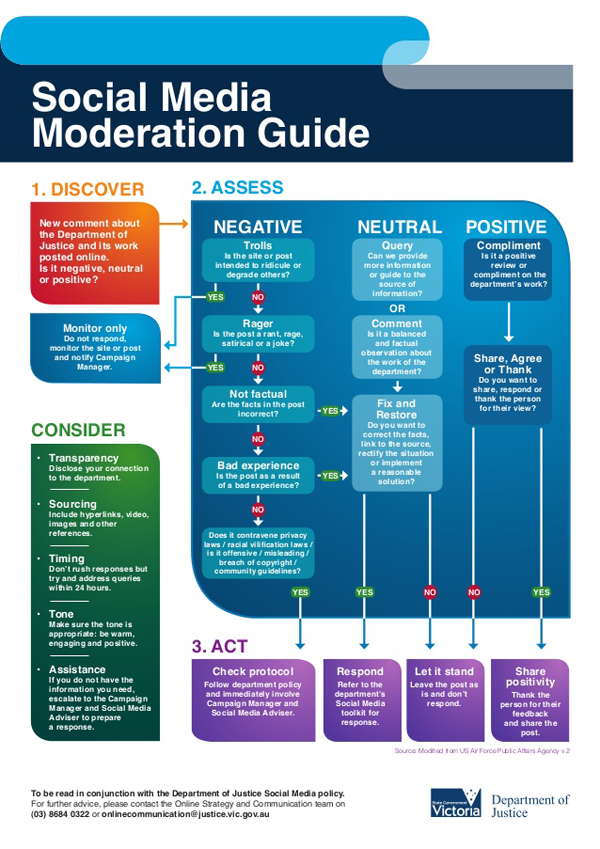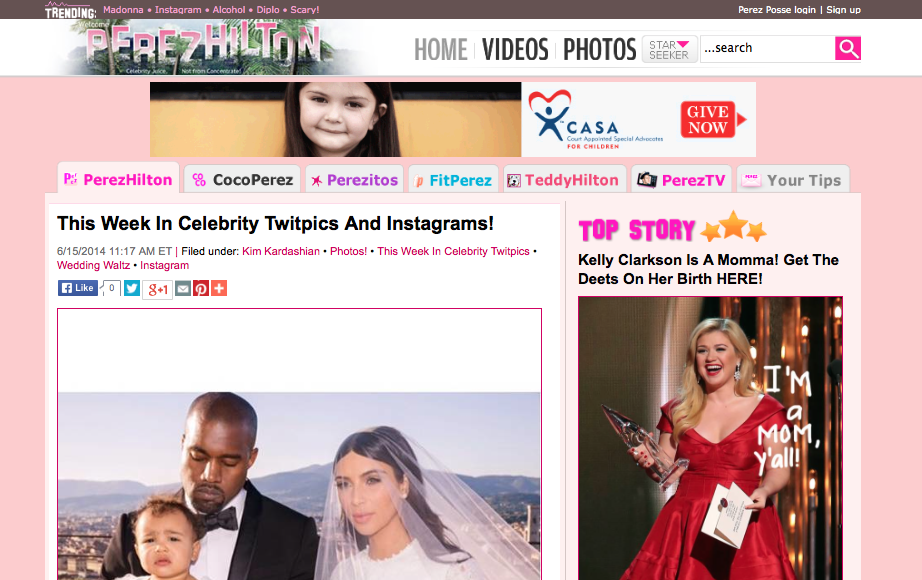Social Media Moderation
February 11, 2015
This week in class we are discussing moderation. Where does that imaginary line fall between what we should allow to stay and what we should delete? We may have some guidelines set forth by the different brands that we work for, but in the end it comes down to using good judgement and our own personal discretion.
When in doubt, refer to the higher ups.
The below comments are simulated and my duty is to respond to them appropriately.
1. To a hotel: “I am disgusted about the state of your restaurant on 1467 Justin Kings Way. Empty tables weren’t cleared and full of remains of meals. It makes me wonder what the state of your kitchen is?!!! Gross.”
My Reply: We are so sorry to hear about your experience, USERNAME. We at The Hotel make every effort possible to make sure you have an exceptional experience while you are on our property, and that includes your dining experience at our restaurant. We have high expectations for our kitchen and waitstaff and recognize that it is unacceptable to anticipate anything less. We will look in to this regrettable situation and hope that you accept our apology. Thank you for letting us know about this matter and we hope that you will join us again at our 1467 Justin Kings Way property. If you would like to discuss this matter further, please contact me at (telephone) number.
Megan Washington
My reason: I believe that by acknowledging this person who has had an unfavorable experience at the hotel by their name, we are applying a personal touch and showing them that this is not an auto-generated reply. Addressing the fact that we let the ball drop in some way and apologizing will allow the guest to see that we are not being defensive and are dedicated to improving the overall experience for the rest of the guests. Furthermore, rather than continuing to air any negative comments after my reply, I have invited the user to call me directly to discuss any problems so that these problems are not viewable by the rest of the internet world.
2. To a mainstream news network: “Your reporting on the Middle East is biased in the extreme. You gave almost all your air time to spokespeople for the Israelis last night and there was no right to reply for the Palestinians. The conflict upsets me so much and your reporting of it, saddens me even more and makes me f**king furious.” (Let us assume the reporting was balanced, with equal time to both sides.)
Reply: To begin with, if there was not an outline of some sort that my brand had for situations such as this, it is advised to refer this up because of the obscene language. Another option is pre-moderation which is actually used by many news organizations according to this moderation information for news sites and media organizations. It warns, though, that if the volume of comments is high, it may be very difficult to moderate successfully.
I will presume that I work for an organization that does not use pre-moderation:
Hi USERNAME, we appreciate and respect your views on last night’s news programming. Our goal is to give equal coverage to both sides so that you, the dedicated viewer, are able to hear all of the latest developments. On occasion we experience time restrictions and do our best to broadcast the fullest amount of information possible. We are mindful to stay away from any bias and we do apologize if there was any indication otherwise.
My Reason: To begin with, news organizations are supposed to report unbiased information so I have mentioned that in the post. Considering how this week’s lecture advised us to to remove obscene or offensive comments, I wanted to do some additional research to make sure that my reply would not be harmful to the brand and allowing the user comment to stay would not be damaging. I realize that what may offend people and what some may consider obscene is most likely not as easy to determine as we would assume–according to our own personal beliefs. I decided to try to get a more solidified definition of what can be considered inappropriate. For example, remember when the Washington Redskins were under fire for what some considered a slur (i.e.: “Redskins”)?
Some important take aways that I would like to highlight:
* FCC stated that profanity can be defined as follows: Profanity. The Commission defined profanity in 2006 as “language so grossly offensive to members of the public who actually hear it as to amount to a nuisance.” Due to “the sensitive First Amendment implications in this area,” the Commission limited its regulation of profane language to “the universe of words that are sexual or excretory in nature or are derived from such terms.”
* The First Amendment and Section 326 [of the Communications Act] prohibit the Commission from censoring program material or interfering with broadcasters’ free speech rights. In view of this, the Commission has stated that it will not take “adverse action on a license renewal application based only upon the subjective determination of a listener or group of listeners as to what constitutes appropriate programming.” It has recognized that: “Licensees have broad discretion — based on their right to free speech — to choose, in good faith, the programming they believe serves the needs and interests of their communities. This holds true even if the material broadcast is insulting to a particular minority or ethnic group in a station’s community.”
* There are no provisions in the Act or the Commission’s rules banning hate speech. We have recognized that, under the principles enunciated in Brandenburg v. Ohio, the Commission can take enforcement action based on broadcast speech that “is directed to inciting or producing imminent lawless action and is likely to incite or produce such action.” We will not do so, however, unless a local court of competent jurisdiction has determined that the speech at issue meets the Brandenburg test.
So how does this relate to moderation and the above sample posts? Well, the FCC seems to have a rather wide acceptance of what people can and cannot say. I know the FCC does not exactly govern what we say and do on the internet, I feel that this gives me a better idea of what can pass as acceptable.
While having information posted about our brands on the internet–which we can assume will be permanent–how far should we let it go? Was this comment really obscene? This particular person was not addressing the station with threats or calling any particular party by inappropriate terms. Rather, I would personally assume that they dropped the profane word because they were indeed frustrated. I would allow this post to stay.
Accordingly, the Social Media Moderation Guide from the Victorian Governments Department of Justice shows that the post that includes the profane word should stay and be responded to rather than being referred up or deleted.

[divider solid]
Tags: fcc, hotel, moderation, news, redskins, social media




Nicely done, Megan!
Thank you for providing the Social Media Moderation Guide from the Victorian Governments Department of Justice. I think this graphic would be beneficial for anyone in our field to use as a reference. It helps determine whether a comment is positive or negative and how to appropriately assess your reply. I thought it was especially helpful to know when a comment is only meant to be monitored, as in the case of trolls and ragers. This further indicates that as a community manager you cannot coddle the complainers. It’s so easy for us to say that any profanity should be deleted as to not offend other users, but as you mentioned the user who left the comment was simply expressing frustration, not intimidating the organization itself.
Very thorough work!
Thank you, Tiffani! I found the graphic from the Victorian Governments Department of Justice to be very helpful too. I spent time trying to think of scenarios that would lead me down one arrow as opposed to the other arrows just so I could get a better idea of what I should be doing as a moderator for my brand. Lucky for me, we receive praise more than anything else but it is important to be prepared and know what to do in order to put out the fire if that time should come. I also appreciated that the graphic said to be positive. I know that I am guilty of feeling angry after reading certain comments at times, and as both the lecture and graphic pointed out–we always nee to keep our cool and be inviting. Turning a negative into a positive is just one of the many hats that we must wear as Social Media Managers :o).
Megan,
Wonderful post!! I appreciated your perspective on personalizing personal touch and showing them that this is not an auto-generated reply. I liked how you directed the person to an offline conversation and remained positive, took ownership of the issue. I’m curious though – why you chose not to offer any compensation to turn a detractor into an advocate. Do you see any value in this solution or do you think it’s a waste of time/resources?
In the second scenario, I liked your option for pre-moderation from the moderation information for news sites and media organizations. I’m also glad you highlighted the first amendment and referenced the FCC on profanity. If your organization’s terms and conditions had you wave your first amendment rights when you sign in, is this still an issue? It was a question I was asking as well. In my scenario I removed the post, but I took the approach to educate and make the user respected and that their thoughts and opinions are still welcomed – just without the profanity. But like you said – where do you draw the line? Would the news organization be liable for profanity? Do you see this as censorship?
Thanks for your thoughts!
Hey Frank,
Thank you! You pose some really great questions.
First of all, I did not feel that it was necessary to offer compensation to the hotel guest who ate at the restaurant because if they had already complained to a manager that night–there is a fair chance their meals would have been on the house. There wasn’t exactly a true way of knowing at that moment. At the same time, my biggest concern would be their overall opinion of the property. I do not think that they would refrain from staying at a wonderful hotel just because they didn’t like the restaurant inside of it; there may be many dinning options around. If I read a review for the hotel online and saw a post saying the restaurant wasn’t the best–that wouldn’t even weigh on my decision if everything else seemed great. Overall, I think there are bigger fish to fry that would be more worthy of compensation such as someone reporting dirty sheets, unclean bathrooms, unkept public facilities, etc. I feel like that would have a far larger dent on business.
Whenever we delete comments we are certainly censoring someone’s opinion. It REALLY is hard to take away someone’s right to say something but at the same time, we do have to look out for our brand’s best interest. If people look elsewhere for information on our brands, we cannot control what they see on a third party website but I do think what they see on our websites and networks should reflect our views and be positive and brand friendly.
I really liked your responses, Megan! Like you, I would’ve kept the second comment — in spite of the profanity, which I detest — because of the social space it was posted on. It’s really hard to not impose our values on others, but it’s also essential when moderating comments. Thank you for the inclusion of the FCC perspective. I wouldn’t have thought to look there for guidance, but it contained some useful thoughts — particularly the part about speech that is “inciting or producing imminent lawless action and is likely to incite or produce such action.” I didn’t feel threatened by the bleeped profanity, and the user also wasn’t attacking anyone.
I also loved the graphic from the Victorian Government DOJ. Great inclusion! I especially liked how they broke down each possible reaction. Trolls, if they’re ridiculing or degrading others, get ignored, meaning they’re just monitored, but not responded to. I thought that it was interesting that those types of comments wouldn’t be deleted, but I appreciated that the graphic took ignoring a comment as a viable action. I have often ignored people I would characterize as trolls in comments, mostly because I didn’t think engaging them would help or add any value. In fact, sometimes I think ignoring trolls helps deflate them, whereas engaging them may fuel them, if they don’t like your response. Do you think ignoring comments can be a viable option some time?
Thanks, AnnMarie!
I appreciate your feedback.
I thought the FCC information was helpful too because things aren’t necessarily as bad as we perceive them to be because we all have a different set of values–so what may seem offensive to me, may be me just taking something out of context. I really wanted to see some sort of rule or set of guidelines that would give me a better idea of where the line may fall for what is proper and what is not.
Trolling sort of reminds me of when dogs beg for food. My dog will stop begging and go lay down if you ignore her because she’s not getting the attention and comes to realization that she’s not going to get people food. Some individuals have a similar behavior when we ignore them and they move on. I cannot recall an experience where I have had to moderate any type of trolling for my employer, but I have ignored some posts. We, on occasion, get people who “demand” we fulfill their requests for things like tracking down a photo of them from fifty years ago in a parade. We have learned through past interactions with this type of scenario that the best reply is no reply. So for us, in this instance, it is a very viable option.